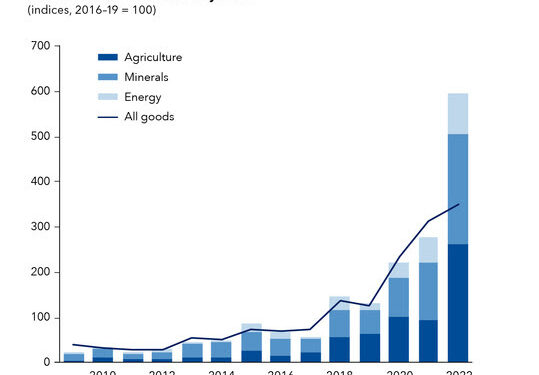Geoeconomic fragmentation threatens food security and clean energy transition
Russia’s invasion of Ukraine in 2022 fragmented major commodity markets. Countries have since restricted trade in commodities, with a more than twofold increase in new policy measures relative to 2021.
Commodities, particularly minerals critical for the green transition and some highly traded agricultural goods, are especially vulnerable in the event of more severe geoeconomic fragmentation, as we show in a chapter of our latest World Economic Outlook chapter.
Further fragmentation could lead to turmoil in commodity markets, causing large price swings. While long-term global economic losses of about 0.3 percent would remain relatively modest due to offsetting effects in net producing and consuming countries, low-income and other vulnerable countries would bear the brunt. In our illustrative simulations, they could face long-term gross domestic product losses of 1.2. percent on average, largely stemming from disruptions in agricultural imports.
For some countries, losses could exceed 2 percent. This would exacerbate food security concerns, as low-income countries are particularly reliant on food imports to feed their population.
These adverse effects are partly due to highly concentrated commodity production, largely a consequence of regional advantages in natural resource endowments. The three largest suppliers of minerals, for example, account for about 70 percent of global mined production on average. Scaling up mining and processing capacity can take years, resulting in slow responses to price signals.
At the same time, some commodities like food and energy play a pivotal role in household consumption, while many minerals are key inputs for vital technologies and manufacturing. This combination of concentrated supply and widespread demand leads to extensive commodity trading, with many countries relying heavily on imports from only a handful of suppliers. This makes commodities more vulnerable in the event of trade restrictions.
Our research indicates that fragmentation of global commodity markets into two hypothetical geopolitical blocs, based on the March 2022 United Nations General Assembly vote demanding Russia end its war on Ukraine, could lead to significant price swings. It could also cause wide price differentials across blocs, particularly of minerals critical to the green transition and highly traded agricultural goods.
Prices would also be more volatile in a fragmented world. Fragmented markets would offer fewer buffers to absorb future commodity shocks, such as poor harvests or extreme weather. Moreover, even a single commodity producer switching its geopolitical allegiance could trigger significant price fluctuations.
Energy transition risk
Commodities fragmentation could hinder the global energy transition. To achieve net-zero-carbon emission targets, demand for minerals is set to rise severalfold in the coming years. Meeting this demand requires a rapid scaling up of supply. Since economically viable deposits are concentrated in a few countries, trade becomes essential to guarantee access to these resources. Fragmented markets could complicate matters.
In our hypothetical scenario where trade of critical minerals between blocs is disrupted, investment in renewable energy and electric vehicles could be lower by as much as 30 percent by 2030, compared to an unfragmented world. This could lead to slower mitigation of climate change.
Call for multilateral cooperation
Our findings present yet another argument for multilateral cooperation on trade policies. If full cooperation remains elusive, pragmatic solutions must be explored to tackle the most pressing challenges: mitigating the risk of food insecurity and supporting the green energy transition.
Urgent efforts are required to ensure the unhindered flow of food and minimize the threat of food insecurity in low-income countries, especially given the increasing frequency and intensity of weather events and natural disasters.
Similarly, multilateral efforts should prioritize establishing a “green corridor,” consisting of a minimal agreement to maintain the flow of critical minerals. This would help avert climate change.
As policymakers work to mitigate fragmentation risks, countries can take proactive steps to minimize the potential economic fallout. Strategies can include diversifying sources of commodities supply, greater investment in mining, exploration, and critical mineral recycling.
Countries should also consider broader policies that strengthen resilience to shocks, including:
- More robust macroeconomic, structural, and fiscal policy frameworks
- Ample fiscal and financial buffers
- Strengthened safety nets
- Preparation for sudden disruptions of commodity supplies
An international initiative to improve data-sharing and standardization in minerals markets could also reduce market uncertainty.
Commodity market fragmentation could create a more unstable global environment, posting threats to food security, economic growth, and the cost of climate change mitigation efforts. Our findings present yet another argument for multilateral cooperation on trade policies to prevent such outcomes.










